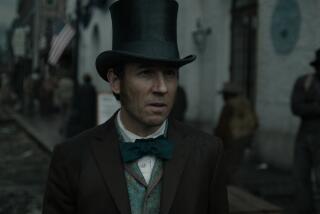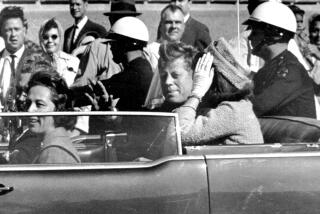DRAMATIC BIOGRAPHY : WARY NBC TO AIR ‘LBJ: THE EARLY YEARS’
- Share via
The path that “LBJ” traveled to get to the TV screen was almost as arduous and roundabout as the one L.B.J. took to get to the White House.
The latter is the subject of the former, a three-hour dramatic biography of former President Lyndon Baines Johnson that has been in the works since 1981 and initially was rejected by all three networks.
Even after a revised approach was approved by NBC in 1985, the project still nearly fell apart when the studio and the network couldn’t agree on financial terms for making it.
But the producers persevered, and “LBJ: The Early Years” finally makes it to the airwaves Sunday, 8 to 11 p.m. on NBC, with Randy Quaid as Johnson and Patti LuPone as his wife, Lady Bird.
The film traces Johnson’s political career from 1934, when he was a congressional aide, to 1963, when he was sworn in as Chief Executive following the assassination of President John F. Kennedy. It also recounts his courtship and long-lasting love affair with Lady Bird--and suggests several other affairs as well.
“This is ‘Eleanor & Franklin’ country-style,” quips Louis Rudolph, the film’s executive producer and co-writer with Ken Trevey and Guerdon Trueblood.
He is only half-joking. As powerful and as effective a leader as Johnson was, the film makers argue that he was at heart a good ol’ boy from Texas--and they sought as much to capture his earthy humor and grand passions as to chronicle his political rise through the House of Representatives, the Senate and the vice presidency.
Indeed, Rudolph said that NBC finally agreed to commission the film after he and his co-producers, John and Sandy Saxon Brice, pitched it as “the real ‘Dallas.’ ” And Peter Werner was chosen to direct it on the strength of the dexterity he had demonstrated in blending comedy and drama on “Moonlighting.”
This romantic portrait is not the L.B.J. that many viewers will remember, which is both the movie’s strong point and its biggest obstacle in attracting viewers.
“What I hope we are able to convey is the surprise that we had in researching who this man really was,” explained John Brice, who started developing the movie with his wife six years ago. “What we found was that he was so much more attractive and interesting than anyone remembers, because what you remember is Johnson from the Vietnam era.”
It was the lingering image of Johnson as the dull, beleaguered commander of an unpopular war that made “LBJ” such a tough sell. The Brices initially proposed it as a six- or eight-hour miniseries but were turned down by the networks. In 1982 they hooked up with Rudolph, who previously had produced TV docudramas about Dwight Eisenhower and Jacqueline Kennedy, and started pitching it as a one-night movie.
NBC then agreed to finance the writing of a script, but it wasn’t until January, 1985, that the network finally gave production approval, the producers said. Before they could begin, however, negotiations over the license fee broke down between NBC and Columbia, under whose auspices the film was to be made, and it was nine months later before another production company, Fries Entertainment, could be found to back it.
Despite these difficulties, the producers received the full cooperation of Lady Bird Johnson, who agreed to reminisce about her late husband for 10 hours and also made available the resources of the Johnson presidential library. But she neither asked for nor was given script approval, Rudolph said.
He recalled his meetings with her with great fondness, praising the former First Lady’s candor and graciousness. That even extended, Rudolph said, to his delicate question about L.B.J.’s reputation as a womanizer. (She first addressed the question several years ago.)
“There was a long pause,” he related. “I wasn’t sure how she was going to react. Finally she smiled, and I’ll never forget what she said: ‘You must understand,’ she told me. ‘My husband loved people. He loved all people. Now, half the people in this world are women. You don’t think I could have kept my husband away from half the people in the world, do you?’ ”
More to Read
Only good movies
Get the Indie Focus newsletter, Mark Olsen's weekly guide to the world of cinema.
You may occasionally receive promotional content from the Los Angeles Times.










